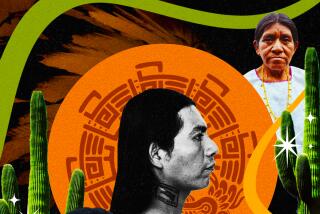Language, straight up
- Share via
Some linguistic scholars sit at home and analyze field data, others convene demographically vetted test groups, but Derek Bickerton will have none of that cautious bunk. In “Bastard Tongues,” his “favorite modus operandi was simply to drive around until I saw a bar I liked the look of.” Drunks, he explains, “are the world’s most underrated language teaching resource.” They speak slowly and with exaggerated care, they often repeat themselves, and they don’t mind if you ask them the same questions over and over. He always asks whether they’ve heard of people speaking a “funny” dialect. Whenever he hears about some isolated village or farming community that has a funny way of talking, he heads there. As soon as he arrives, he finds a bar he likes the look of and begins his night.
There is a logic behind this madness. Bickerton has made transformative discoveries about the way we acquire language by seeking out those odd-sounding tongues that mainstream scholars have long ignored, and even failed to acknowledge as distinct languages. Namely, he has devoted his life to the study of pidgins and Creoles.
“Pidgin” refers to the makeshift speech that springs into existence when people who speak mutually incomprehensible languages are thrown together. This occurred frequently under colonial rule; it also happened when slaves were shipped from numerous African countries and forced to work on the same plantation. Pidgin is spoken slowly and graspingly, has no formal set of rules or consistent structure, and relies heavily on the speakers’ native languages. But it doesn’t last. The children of slaves, even though they grew up hearing pidgin, spoke a different language among themselves -- Creole. The Creole had a stable vocabulary and a structured, complex grammar. Their parents often couldn’t understand what their own children were saying. After all, they had invented a new language.
“Bastard Tongues” is the story of Bickerton’s effort to solve the mysteries posed by his research. How did fully formed languages emerge from the scraps of pidgin? Why could children speak Creole, but not their immigrant parents? And why did Creole languages from all over the world display numerous similarities, despite their geographical isolation from each other? The book is part memoir, part intellectual detective story and part linguistics primer. Bickerton is a spirited, clever writer, and the tripartite nature of the narrative suits him. Just as soon as we’ve heard a little more than necessary about academic infighting, we find ourselves in an open truck leaving Cartagena, en route to a small town whose inhabitants are rumored to speak a funny kind of Spanish; once we arrive, we’re given a demonstration of linguistic principles in action; but as soon as we’ve heard our fill about LADs (language acquisition devices) and ASPs (aspect markers), we’re in Guyana, drinking home-brewed rum.
Bickerton’s innovative methods don’t end at the local bar, however. His book focuses on two ambitious experiments for which he was never able to receive funding -- though the fact that he got very close is a testament to the persuasiveness of his enthusiasm. He proposed marooning speakers of six mutually unintelligible languages, with their young children, on a desert island for three years to see whether the children would begin speaking a language of their own. He also suggested putting South American orphans on a large estate, where they would be cared for by nannies using an artificial vocabulary of nonsense words and monitored by surveillance cameras and microphones. “Anyone else is welcome to . . . run it and take the credit for it,” he says, showing some awareness of the odds of achieving funding for it. “All I care about are the results.”
One is convinced after reading Bickerton that the results would back up his grand theory of human speech, which he calls the “language bioprogram” -- an idea that draws significantly from Noam Chomsky’s theory of a “universal grammar.” All human beings, Bickerton argues, are born with a sense of grammar, a universal language template. Words can vary from place to place and are bound only by the limits of human creativity and the larynx. But grammar is innate. A child needs only to hear the most rudimentary smattering of sounds -- a pidgin tongue, for instance -- to fashion a language out of it, set with a complex structure. This is why Creole languages bear striking similarities to each other and to the world’s older, more established languages.
The National Geographic Enduring Voices project estimates that there are now fewer than 7,000 languages spoken in the world, and that number is declining precipitously -- one dies every two weeks. Nearly half of today’s spoken languages may disappear in this century. With the languages die the cultures and knowledge contained in them, and the range of human experience narrows. Bickerton’s book doesn’t make these losses more acceptable, but it does illuminate a bond shared by all tongues -- a vestigial connection to Babel. We can take some solace in the ease with which we can create languages out of nothing. All you need, after all, is two infants, a nanny speaking nonsense and a desert island.
More to Read
Sign up for Essential California
The most important California stories and recommendations in your inbox every morning.
You may occasionally receive promotional content from the Los Angeles Times.













